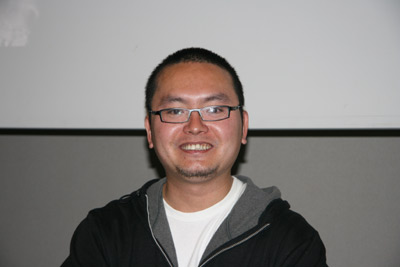Charity travel project supports rural education
- By Fan Junmei
 0 Comment(s)
0 Comment(s) Print
Print E-mail
China.org.cn, January 29, 2010
E-mail
China.org.cn, January 29, 2010
|
|
|
Andrew Yu [China.org.cn] |
Yu was born in a village in Jiangmen City of Guangdong Province in 1973. He travelled a lot, and was shocked by the imbalance between rural and urban education throughout China. "What can I do for those poor children? Apparently the power of an individual is tiny," he asked himself until April 2004, when his life was dramatically changed by a simple story.
His friend Cui Yingjie travelled to Yunnan Province that year, and met two volunteer teachers in a poor village. One asked him to take a message to the volunteer teacher in another village telling him that "he is not alone," and "to persist is to win." It was not easy for these volunteers to find companions who could understand and support them. They explored the poverty-stricken areas and strived forward, equipped only with the belief "to persist is to win."
![1 KG MORE Volunteer talks with students [Yesky.com] 1 KG MORE Volunteer talks with students [Yesky.com]](http://images.china.cn/attachement/jpg/site1007/20100129/000802ab80120cccceb703.jpg) |
|
1KG MORE Volunteer talks with students of Sichuan's Dazu Primary School.[Yesky.com] |
"It might help if travelers carry 1kg more of books when they travel to the countryside. They can distribute the books to children there and communicate with them. That's how the idea of 1KG MORE came into my mind," Yu recalled at a lecture on commonweal activities of individuals.
A non-governmental organization, '1KG MORE' advocates an innovative concept of travel, where every traveler may help the local rural community. It established a website as a community for assembling travelers, where travel is connected to public services. Travelers are encouraged to carry 1kg more of books or stationery to rural students, and information of rural schools or travel experience can be shared among travelers through the website, calling for more attention from the community. Travelers who upload information on a school can become the "ambassador" to that school, and will continuously help them organize activities and seek support.
Since April 2004, volunteers of 1KG MORE have collected detailed data about more than 600 rural schools. According to statistics, over 10,000 participants have carried out 1KG MORE travels, at least 1 million people have felt the knock-on effect; and volunteer groups have been organized in almost all the major cities of China. China has seen a rapid development in philanthropy in the past few years. Official statistics show that donations toward charitable causes in the country reached 107 billion yuan (US$15.6 billion) in 2008, 3.5 times that of the previous year.
![Volunteers from Lenovo and 1 KG MORE communicate with students. [Yesky.com] Volunteers from Lenovo and 1 KG MORE communicate with students. [Yesky.com]](http://images.china.cn/attachement/jpg/site1007/20100129/000802ab80120ccccfd504.jpg) |
|
Volunteers from Lenovo and 1KG MORE communicate with students of Sichuan's Dazu Primary School. [Yesky.com] |
"If you can't do big things, do small ones, like carrying 1kg more of books or stationery to children." Casual philanthropy is what he advocated, which requires no serious responsibility. "Happy", "casual", and "fun" are its key words. "If you can do it in your journey, it's great; if you can't, it's ok. Nothing to feel guilty about. You can do it next time. Make donation a part of travel and that will make you happy."
Nuannuan, a girl who lives in Beijing, was attracted by Yu's concept in 2007 and began to take part in the activities organized by 1KG MORE. She is now responsible for the activities in cities surrounding Beijing. "Charity is just there, everyone can do it,"she said.
"We encourage travelers to provide not only material help, but also communication. The positive effect generated by such communication can be immeasurable," Yu stated. "Travelers may be depressed by the hard living of those children, but such sentiment is not helpful. A smile can shorten the distance between two hearts. No matter rich or poor, every child has a happy childhood; commonweal travel should be happy, full of smiles."
1KG MORE was registered as Aiju (Beijing) Consulting Co. Ltd in April, 2008, becoming a social enterprise. It generates revenue by offering charity consultation and services to enterprises, and applies part of the income to team operation and the rest to charitable activities. To provide more resources to charitable activities, on December 29, 2009, the 1KG More Fund was launched by Aiju and China's Social Welfare & Education Foundation.
1KG MORE is now working with enterprises on the projects like "Charity Card"--if you buy a card, 1KG MORE will donate a book to a rural school; and "Living Library", providing rural students with better reading resources. "Everything has gone well so far. I believe we can make it better," said Yu with a smile.







Go to Forum >>0 Comment(s)